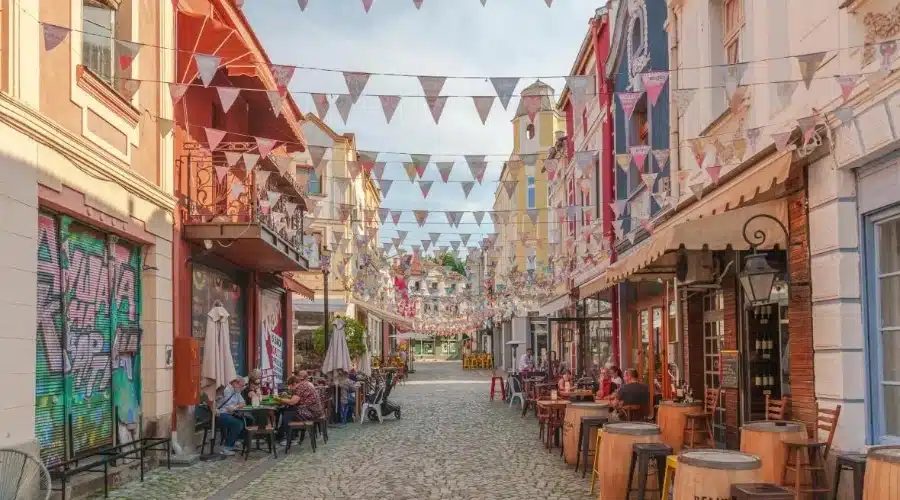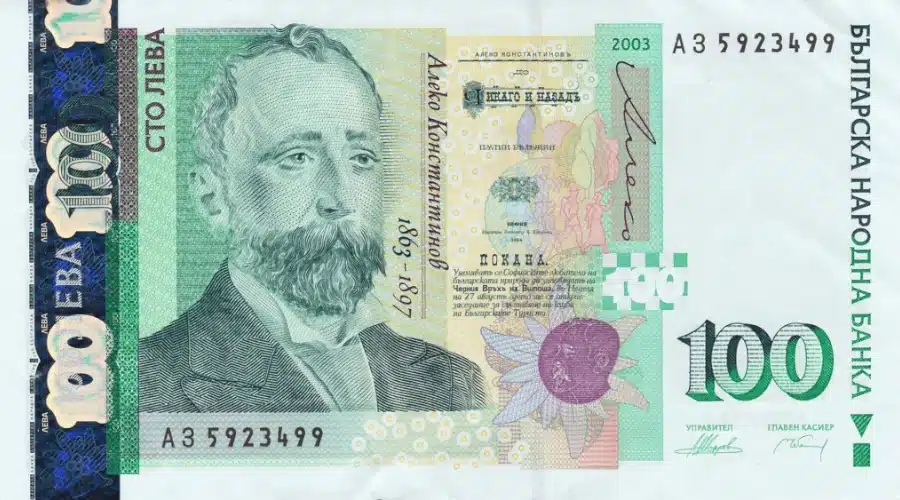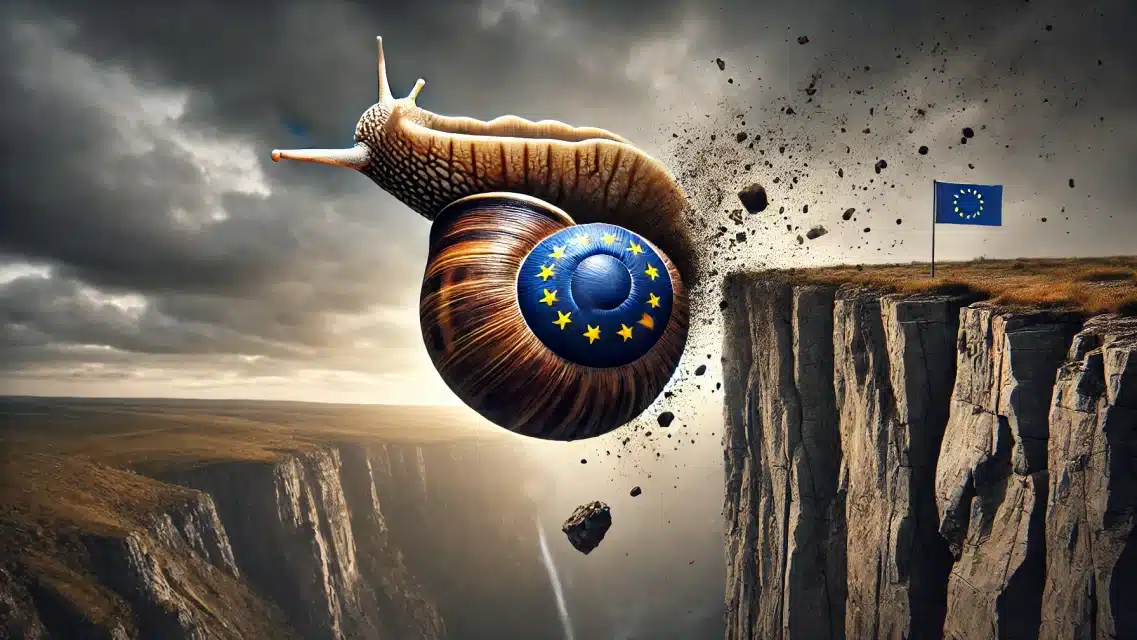I gave a talk once, recounting how I first fell in love with a Bulgarian woman—and then, over time, I fell in love with Bulgaria itself. It wasn't immediate. Life got in the way. A few years of COVID. Kids growing up. Obligations. But something kept pulling at me, whispering that this country—its people, its rhythm, its contradictions—was calling me. And now, finally, at 51 years old, I find myself in Plovdiv, not just visiting, but here, living, breathing, building. It's not a midlife crisis. It's a midlife truth.
People thought I'd lost my mind. “You're leaving Sweden? For Bulgaria?” The words came laced with polite confusion and veiled judgment. “The poorest country in the EU,” they'd say, quoting economic data like scripture. They couldn't understand it. But that's because they can't see what I see.
Because what I see in Bulgaria isn't poverty. I see rawness. I see a country unpolished by the smoothing acid of Western conformity. I see history not yet domesticated, and potential not yet mortgaged to the Brussels consensus. Sweden had become a place of comfort, yes—but also sedation. A nation where innovation dies on the altar of consensus, where risk is engineered out, and identity is slowly melted into bland bureaucratic paste. Bulgaria, by contrast, pulses with life and contradiction. It hasn't yet sold its soul for a seat at the table. That alone makes it one of the last places in Europe that still feels real.
Here, I watch craftsmen in Kapana district work sixteen-hour days, then seamlessly transition to sharing rakija with friends until midnight—their hands still bearing the honest calluses of their trade. I see young tech entrepreneurs building startups from café tables, pivoting between intense work and animated discussions about politics, art, life. The work-life boundary here isn't a Berlin Wall—it's a permeable membrane. Bulgarians work fiercely but refuse to surrender their social connections at the altar of productivity. In Sweden, we scheduled dinners with friends three weeks in advance. In Plovdiv, my neighbour knocks on my door at 9pm: “Come, we're grilling. Bring wine.” This is living.

And so, standing in the shadow of Vitosha, breathing in the scent of linden trees and grilled kebapche, I find myself watching this small but defiant nation standing at the crossroads—its hand trembling over the pen that would sign away its currency, the Bulgarian Lev, in exchange for a seat at the eurozone's polished but crumbling banquet. And I want to scream: Don't do it!
You see, I didn't come here looking for comfort, as it's the mind killer of innovation. I came here for sovereignty, friction and therefore creativity. For a place where national identity still means something more than a passport cover. And the Lev—this small, undervalued, quietly powerful coin—is part of that. Giving it up isn't progress. It's capitulation.
To most Eurocrats and Western commentators, the case for adopting the euro sounds seductively rational. Bulgaria, they say, already has its currency pegged. Why not just take the next step? Why keep pretending you're different when your economy is already halfway married to Frankfurt? To them, integration is inevitability. But I see that for what it is: a philosophy of dispossession. It is the belief that the future is only available through surrender—surrender of control, of symbols, of pride.
I've lived through systems that promised order in exchange for liberty. And they all had the same thing in common: they underestimated the cost of giving up the power to say no.
Bulgaria has weathered storms that would have broken other nations. From Ottoman rule to Soviet influence, from the painful transition to free markets to the 1996-97 economic crisis—each time, Bulgarians found a way to preserve their essence. This resilience isn't accidental. It comes from maintaining cultural sovereignty even when political sovereignty was compromised. The Lev, born in 1881 with Bulgaria's liberation, carries this story in its DNA. It has survived wars, hyperinflation, and regime changes. It bears witness to Bulgaria's endurance. Unlike the euro, it speaks the language of this soil.
Joining the euro isn't just about money. It's about power—and identity. A currency is the mirror of a nation's soul. It carries not just economic utility, but emotional sovereignty. It says: we are different. We choose. The euro, by contrast, is a flattening force. A pan-European experiment in making everyone speak the same fiscal language, regardless of dialect, desire, or destiny.
The eurozone is not a club of equals. It's a rigid structure engineered for economies like Germany's, and everyone else is expected to contort themselves to fit. The poor performers are punished. The outliers are ignored. And the “unfortunate” are bailed out only after they've been bled dry. Greece learned this the hard way. Italy knows it now. Bulgaria has no business walking into that mess with eyes wide shut.
And let's be brutally honest: this is not a moment of strength for the European project. The Union's economic direction is uncertain at best, fractured at worst. It is still staggering under the weight of post-COVID debt, Green Deal contradictions, and the aftermath of the war in Ukraine. And now, with Donald Trump back in campaign mode and already reimposing tariffs on EU steel and aluminium, the fragility of global trade has been exposed again. This isn't the past repeating—it's the present deteriorating. The trade war machine is warming up, and Europe is back in its sights.
We are entering a new era—not of globalization, but of fragmentation. The global economy is no longer predictable. Trade alliances shift. Supply chains wobble. Strategic dependency is punished. In this reality, where national interest trumps every treaty and every principle, a country without its own currency is like a soldier without armour.

The Lev, humble and often underestimated, gives Bulgaria room to breathe. Room to respond. It is a tool of resilience. Of adaptation. Of choice. If Trump's tariffs escalate, or if Europe's industrial decline accelerates, or if financial contagion spreads across Southern Europe again, Bulgaria will need every inch of flexibility it can keep. And the euro offers none.
When you walk through the cobblestoned streets of Staria Grad, you see Roma craftsmen still hammering copper by hand, grandmothers selling home-made lutenitsa in recycled jars, cafés doubling as community centres. This is an economy of relationships, not just transaction. The Lev flows through these streets with the intimacy of a local river. The euro would be an imported canal—efficient perhaps, but soulless.
By keeping the Lev, Bulgaria keeps something precious: the right to manoeuvre. The right to respond. The right to say, “No, that's not what's best for us.” It's easy to forget how powerful that is—until it's gone.
I didn't move to Bulgaria because I wanted to blend in. I moved here because I wanted to be somewhere that still has its own face. That face includes the Lev. Lose it, and we don't become more European—we just become more invisible.
I know the argument. I've read it in EU policy memos and seen it in the bleached smiles of financial consultants: “Bulgaria already has its currency pegged. Euroization is just formalizing the inevitable.” But inevitability is the lazy man's prophecy. The truth is, a peg is a decision. A reversible, sovereign decision. The euro is a trap door. Once you fall through, there's no going back—no devaluation, no escape, no dissent. Your monetary policy is no longer yours. Your economic oxygen is regulated from Frankfurt.
And do you think Frankfurt cares about the farmer in Rhodope mountains selling his honey by the roadside? About the tech startup in Sofia trying to compete with Silicon Valley? About the small factory in Ruse struggling with energy costs?
The ECB's policy won't bend for Bulgarian farmers, shopkeepers, or small businesses. It won't shift interest rates for our benefit when another German recession is looming. You're not gaining control. You're signing it away.
Look at what happened to Greece. Look at Italy. Economies paralysed by monetary decisions made hundreds of miles away, forced to swallow austerity they didn't vote for, cut pensions they couldn't afford to lose, bleed for a union that offered unity only on paper. The eurozone, for all its press releases and summits, has never learned how to make itself fair. It only knows how to enforce obedience.
Let's stop pretending this is a calm world. It isn't. The rules of globalization are being rewritten in real time. The US and China are racing to decouple. Germany is in industrial decline. Tariffs are back. Trade is weaponized. The Lev, modest as it may seem, is a rare weapon: a policy lever that Bulgaria still owns. Why hand that over—now of all times?
Currency is not a spreadsheet item. It's a story. A symbol. A living embodiment of who gets to decide. The Lev may not be flashy, but it speaks Bulgarian. It reflects our cycles, our values, our decisions. The euro? It doesn't speak any national language. It speaks power. Centralized, sanitized, and unbending.
And power, once given away, doesn't come back.
By keeping the Lev, Bulgaria keeps its final line of defence. Not against enemies with tanks, but against policy made without empathy. Against decisions that crush instead of compromise. It keeps the ability to say no when everyone else nods yes out of fear. The Lev is not the problem. The Lev is the shield. And I didn't come to Bulgaria to watch it lower its shield.
I came here because I believe in countries that still believe in themselves. I came because I wanted to be in a place that hasn't yet outsourced its future. Bulgaria doesn't need to apologize for being cautious. It needs to stand taller because of it. We've seen what happens to small nations that give away their autonomy in return for a little prestige and a promise of “stability.” The cost is always higher than advertised.
This is a moment to pause. To reflect. To remember that freedom is not just about voting every four years—it's about having the tools to shape your own destiny. The euro offers efficiency, perhaps. But it demands obedience. And Bulgaria, for all its flaws, is not a nation built to obey. It is a lion. And lions don't trade their roar for a comfortable cage.
So I say this, as I sit on my balcony watching the sunset paint the hills of Plovdiv the same gold as the Lev coins in my pocket: don't give up your currency. Don't follow Europe's false map to someone else's future. Keep your Lev. Keep your pride. Keep your power.
Because in a world that's drifting, Bulgaria still has a compass. Don't throw it away.



